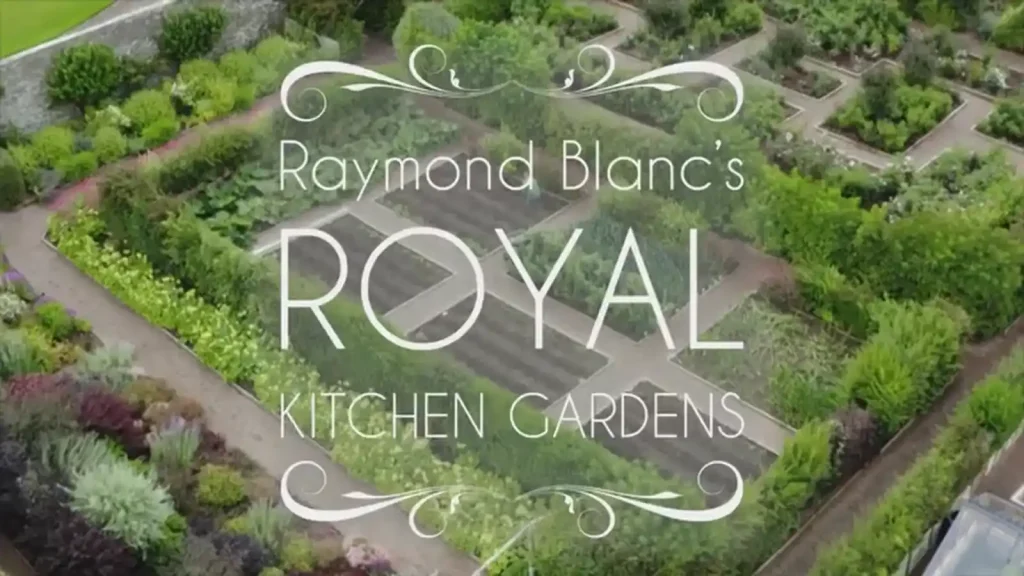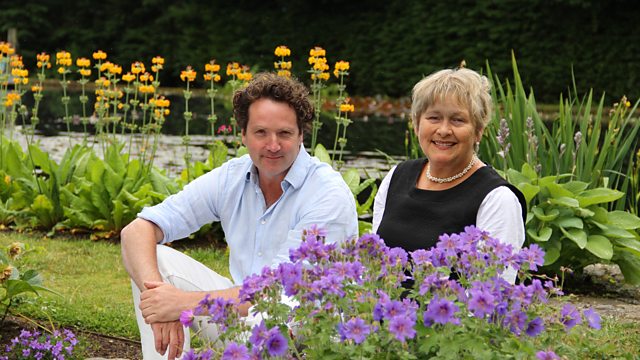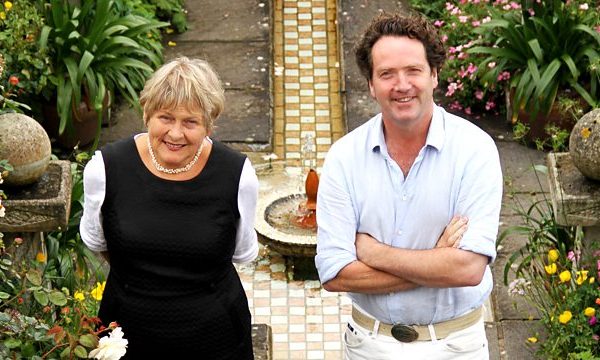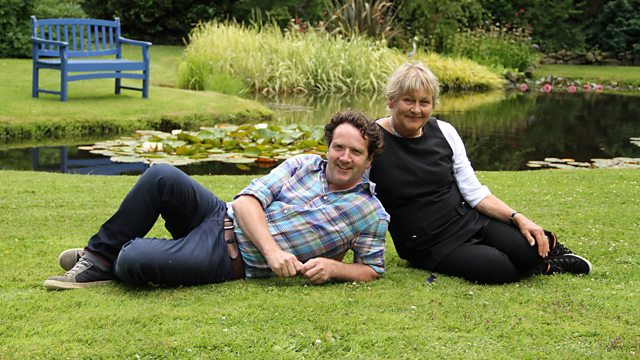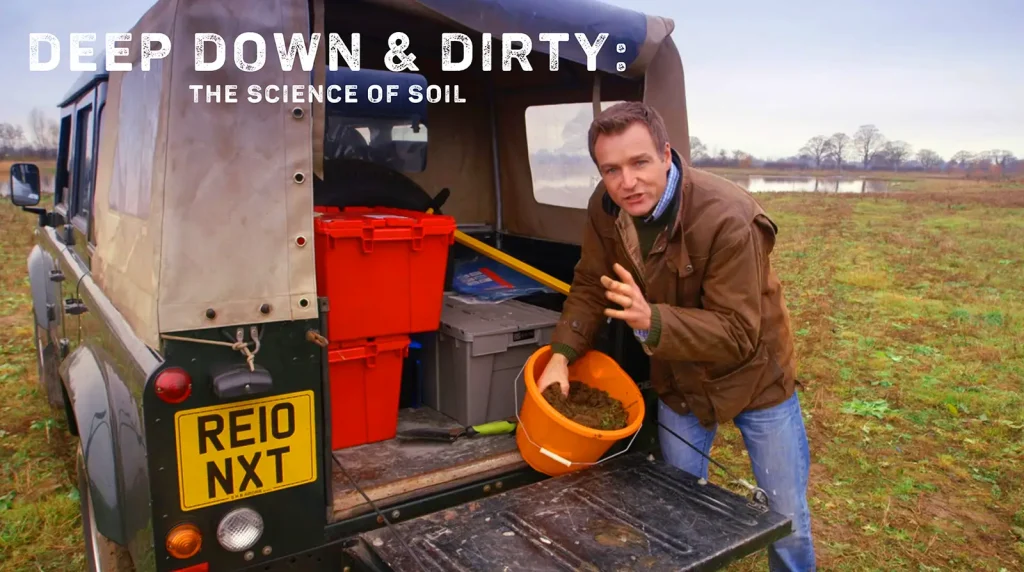Raymond Blanc’s Royal Kitchen Gardens episode 8: In the heart of Scotland lies Dumfries House, a magnificent estate built in the 18th century that stands as a testament to the grandeur of Scottish architecture. Renowned for its opulent interiors and priceless furniture, Dumfries House is not just a historic mansion but a living example of elegance and heritage. In this episode of Royal Kitchen Gardens, celebrated chef Raymond Blanc makes a return visit to this stately home, uncovering the ways in which King Charles III is striving to nurture a new generation of gardeners.
Dumfries House, with its rich history and breathtaking design, offers an ideal backdrop for Blanc’s culinary and horticultural journey. As he strolls through the meticulously maintained gardens and lush greenhouses, Blanc is immersed in the legacy and vision that King Charles III hopes to cultivate. The King’s commitment to sustainability and education is evident in every corner of the estate, from the thriving vegetable plots to the innovative gardening techniques employed.
Blanc’s exploration of Dumfries House is not merely a tour of beautiful grounds; it is a deep dive into the intersection of tradition and modernity. The King’s efforts to inspire young gardeners are showcased through various educational programs and hands-on initiatives designed to instill a love for horticulture in the youth. These programs aim to teach essential skills that are becoming increasingly relevant in today’s world, promoting sustainability, self-sufficiency, and a connection to nature.
During his visit, Blanc meets with some of the participants of these programs, gaining insights into their experiences and aspirations. He listens to their stories, understanding the impact of the King’s vision on their lives and futures. Through these interactions, the episode highlights the transformative power of gardening, showing how it can empower individuals and communities alike.
Amidst the verdant splendor of Dumfries House, Blanc delves into the culinary aspects of the estate. He discovers the secret behind a traditional Scottish soup, learning about the local ingredients and age-old techniques that make it a beloved dish. This segment of the episode not only showcases Blanc’s culinary prowess but also emphasizes the importance of preserving culinary heritage.
Raymond Blanc’s Royal Kitchen Gardens episode 8
The highlight of the episode comes when Blanc prepares a mouth-watering eggplant parmigiana. Using fresh produce from the estate’s gardens, he demonstrates the art of creating this classic dish with a modern twist. His passion for cooking, combined with the finest ingredients from Dumfries House, results in a culinary masterpiece that reflects both tradition and innovation.
Throughout the episode, the narrative seamlessly weaves together themes of history, education, sustainability, and gastronomy. Blanc’s journey at Dumfries House serves as a microcosm of a broader movement towards reconnecting with our roots and nurturing the environment. King Charles III’s dedication to these principles is portrayed not just as a royal endeavor but as a mission with universal relevance.
As the episode concludes, viewers are left with a profound appreciation for the rich heritage of Dumfries House and the forward-thinking initiatives championed by King Charles III. Blanc’s visit serves as a reminder of the beauty and potential that lies in the harmonious blend of past and present, tradition and innovation.
Raymond Blanc’s Royal Kitchen Gardens: Episode 8 is a celebration of Scottish heritage, culinary artistry, and the enduring power of nature. Through Blanc’s eyes, we see the impact of King Charles III’s vision and the promise it holds for future generations. The episode is a testament to the idea that by nurturing our gardens and our young minds, we can cultivate a more sustainable and beautiful world.
Unveiling the Royal Kitchen Gardens: A Culinary Journey with Raymond Blanc
The Regal Allure of Dumfries House
Picture a majestic Georgian mansion, its elegant façade gleaming in the Scottish sunlight. This is Dumfries House, a crown jewel in Britain’s architectural heritage. Like a phoenix rising from the ashes, this grand estate has been given a new lease on life, thanks to the vision and passion of His Majesty King Charles III.
As we step into this world of regal splendor, we’re joined by none other than the celebrated chef Raymond Blanc. His eyes sparkle with excitement as he embarks on a culinary odyssey through the royal kitchen gardens. The air is thick with anticipation, for these are no ordinary gardens – they are living, breathing testaments to centuries of horticultural wisdom.
A Garden Reborn
Wander with us through the walled garden, where history and horticulture intertwine like vines on a trellis. Once a derelict dumping ground, this four-acre plot has blossomed into a veritable Eden. The transformation is nothing short of miraculous, rivaling the most ambitious garden restorations in Scottish history.
As Raymond meanders through the neat rows of heritage vegetables, his chef’s mind is already whirring with possibilities. Each plant tells a story – of traditional farming methods, of flavors long forgotten, and of a commitment to sustainability that reaches the highest echelons of British society. The garden, much like a well-crafted dish, is a harmonious blend of elements, each playing its part in a greater whole.
A Royal Vision
At the heart of this horticultural renaissance lies the unwavering dedication of King Charles III. His vision for Dumfries House extends far beyond mere preservation. It’s a blueprint for the future, where heritage and innovation walk hand in hand. The King’s passion for sustainable agriculture and education has breathed new life into these centuries-old grounds.
Consequently, what was once a pleasure palace for the privileged few has evolved into a beacon of learning and inspiration for all. The estate now hums with activity, as visitors from all walks of life come to soak in its history and partake in its bounty. It’s a living, breathing example of how the past can inform and enrich our future.
From Seed to Plate: Culinary Education and Sustainability
Cultivating Young Minds
At Dumfries House, education isn’t confined to stuffy classrooms. Instead, it blossoms in the vibrant, living laboratory of the kitchen garden. Here, children’s eyes widen with wonder as they discover the magic of nature’s bounty. Their small hands dig into rich soil, planting seeds of knowledge that will grow alongside the vegetables they tend.
Education gardener Julie, a veritable fairy godmother of flora, guides these young explorers through a world of sensory delights. “It’s not just about tasting,” she explains, her eyes twinkling with enthusiasm. “They’re smelling, touching, and feeling the different types of leaves.” This hands-on approach transforms the garden into an outdoor classroom, where every plant tells a story and every harvest is a lesson.
A Feast for the Senses
Imagine a child’s delight as they pluck a sun-warmed tomato from the vine, its skin still warm from the Scottish sun. Or picture their surprise as they unearth a potato, like a treasure hunter discovering buried gold. These experiences forge a connection between the food on their plates and the earth beneath their feet, nurturing a lifelong appreciation for sustainable living.
The garden’s 70 varieties of heritage vegetables serve as living textbooks, each with its own unique history and growing requirements. As children learn to care for these plants, they’re also absorbing invaluable lessons about patience, responsibility, and the delicate balance of ecosystems. It’s a holistic education that nourishes both body and mind.
Bringing Royal Produce to Life
While the children sow seeds of knowledge in the garden, culinary magic unfolds in the kitchens of Dumfries House. Here, Raymond Blanc and executive chef Tom Scoble transform the garden’s bounty into gastronomic masterpieces. Their creations are a testament to the estate’s commitment to sustainability and local sourcing.
Raymond’s eyes light up as he surveys the day’s harvest. “Give me any food, especially when it comes from the garden. Perfect,” he exclaims, his French accent thick with excitement. In his capable hands, humble vegetables become works of art, each dish telling a story of the land from which it came.
A Royal Feast
Tom Scoble, meanwhile, crafts dishes fit for a king – quite literally. His potato and broad bean soup with bacon and duck egg is a symphony of flavors, each ingredient singing of its origins in the Dumfries House gardens and farm. As he prepares the dish, Tom explains the importance of using local, seasonal produce. “It’s absolutely fantastic for me and for the team,” he says, his passion evident in every word.
This farm-to-table approach isn’t just about creating delicious meals. It’s a philosophy that permeates every aspect of life at Dumfries House. By showcasing the incredible flavors of locally-grown produce, Raymond and Tom inspire visitors to embrace sustainable eating habits in their own lives. They’re not just feeding bodies; they’re nourishing a movement towards a more sustainable future.
F.A.Q. Raymond Blanc’s Royal Kitchen Gardens episode 8
Q.: What is the main focus of Raymond Blanc’s Royal Kitchen Gardens episode 8 at Dumfries House?
A.: The episode centers on Raymond Blanc’s visit to Dumfries House, where he explores the estate’s rich history, stunning gardens, and culinary traditions. It highlights King Charles III’s initiatives to inspire young gardeners through education and sustainable practices.
Q.: How does Dumfries House contribute to educational programs?
A.: Dumfries House hosts various educational programs aimed at teaching young people about horticulture, sustainability, and self-sufficiency. These hands-on initiatives encourage participants to engage with gardening, fostering a deep appreciation for nature and sustainable living.
A.: Raymond Blanc delves into the culinary heritage of Dumfries House by learning the secret behind a traditional Scottish soup and preparing a delectable eggplant parmigiana using fresh produce from the estate’s gardens. His culinary journey emphasizes the importance of preserving and innovating traditional dishes.
Q.: How does King Charles III’s vision influence Dumfries House?
A.: King Charles III’s vision for Dumfries House is deeply rooted in sustainability and education. His efforts have transformed the estate into a hub for learning and innovation, where historical preservation and modern sustainability practices coexist to inspire future generations.
Q.: What role does sustainability play at Dumfries House?
A.: Sustainability is a core principle at Dumfries House, reflected in its thriving vegetable plots and innovative gardening techniques. The estate’s commitment to sustainable agriculture is evident in both its educational programs and the farm-to-table culinary practices showcased in the episode.
Q.: Who benefits from the educational programs at Dumfries House?
A.: The educational programs at Dumfries House benefit a diverse group of participants, particularly young people. These programs aim to instill essential gardening skills, promote environmental awareness, and encourage sustainable living practices among the youth.
Q.: What makes Dumfries House an ideal setting for this episode?
A.: Dumfries House’s rich history, breathtaking architecture, and beautifully maintained gardens provide an ideal backdrop for Raymond Blanc’s exploration of culinary and horticultural traditions. The estate embodies a harmonious blend of historical elegance and modern sustainability.
Conclusion: A Royal Legacy of Sustainable Food and Education
The Lasting Impact of Dumfries House
As the sun sets over the lush Scottish landscape, casting a golden glow on the Georgian façade of Dumfries House, one can’t help but reflect on the profound impact this estate has had. Like a pebble dropped in a pond, the ripples of change emanating from this royal project have spread far and wide, touching lives and transforming communities.
At its core, Dumfries House stands as a testament to the power of vision and perseverance. What was once a crumbling relic of the past has blossomed into a vibrant hub of learning and sustainability. The estate’s transformation mirrors the journey many of us must undertake – from passive consumers to active stewards of our environment.
A Beacon of Sustainable Agriculture
In the walled gardens and fertile fields of Dumfries House, we find more than just bountiful harvests. We discover a blueprint for a more sustainable future. The estate’s commitment to organic farming practices and heritage breeds serves as a living example of how traditional wisdom can be harnessed to address modern challenges.
Moreover, the success of Dumfries House in reviving rare breeds like the Scotch Dumpy chickens offers hope for biodiversity conservation worldwide. It reminds us that with dedication and proper management, we can turn the tide on species loss and preserve our rich agricultural heritage for future generations.
Cultivating Knowledge and Passion
Perhaps the most enduring legacy of Dumfries House lies in its role as an educational powerhouse. By opening its doors to learners of all ages, the estate has sown seeds of knowledge that will continue to grow and flourish long into the future. The children who have dug their hands into the rich soil of the kitchen gardens carry with them more than just dirt under their fingernails – they carry a newfound appreciation for the natural world and their place within it.
Furthermore, the culinary innovations of chefs like Raymond Blanc and Tom Scoble, inspired by the estate’s produce, serve as delicious proof of the farm-to-table philosophy. Their creations not only tantalize taste buds but also educate palates, encouraging a return to seasonal, locally-sourced eating.
The Future of Royal Kitchen Gardens
As we look to the horizon, the future of royal kitchen gardens seems brighter than ever. Dumfries House has set a new standard, demonstrating how these historical spaces can be reimagined as centers of innovation and education. The model established here has the potential to inspire similar initiatives around the world, creating a network of living laboratories dedicated to sustainable agriculture and culinary excellence.
The success of Dumfries House also underscores the crucial role that leadership plays in driving positive change. King Charles III’s unwavering commitment to this project serves as a powerful reminder that when those in positions of influence champion sustainability, the impact can be truly transformative.
Inspiring New Generations
As we move forward, the true measure of Dumfries House’s success will be in the generations it inspires. The young minds nurtured in its gardens and classrooms may well become the environmental leaders and innovative farmers of tomorrow. They will carry with them the lessons learned here – the importance of biodiversity, the value of traditional knowledge, and the delicious rewards of sustainable living.
In essence, Dumfries House has become more than just a beautifully restored estate. It has evolved into a living, breathing manifesto for a more sustainable and connected way of life. As visitors leave its grounds, they take with them not just memories, but a renewed sense of purpose and possibility. In this way, the legacy of Dumfries House continues to grow, much like the verdant plants in its celebrated kitchen gardens.
